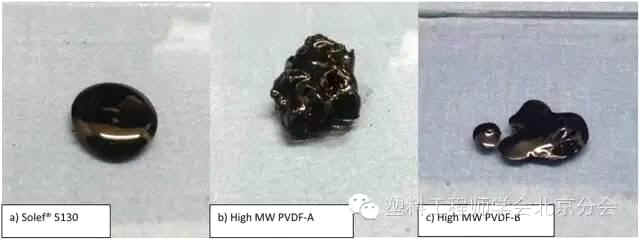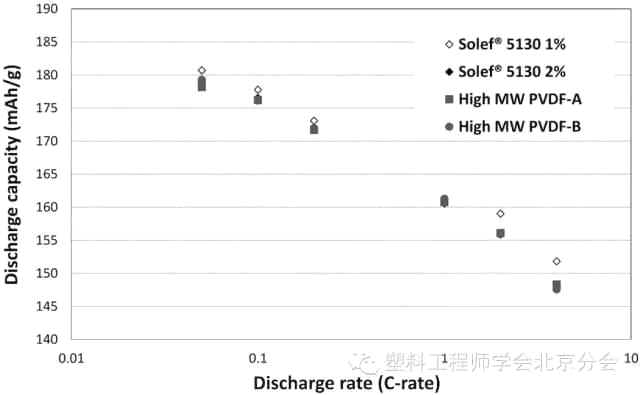资讯中心
新闻动态
高分子量聚偏氟乙烯作高容量阴极材料
2016-06-30优化粘合剂制备的浆液有着良好的流变学特性,应用在锂离子电池领域具有成本较低的优势。
锂离子电池(LIBS),这个当前最有前途的储能技术,有着十分广泛的应用,包括混合动力汽车和电动汽车。这些特殊的应用对LIBS的主要要求是具有高能量密度和快速充电/放电的能力。为了进一步提高LIB的能量密度,可以采用以下两个简单的方法。第一个方法是采用高能量的阴极材料,例如富镍锰钴(Ni-rich NMC)材料,这样的材料被认为是实现下一代富Ni阴极的关键因素。第二种方法是加入大量的活性物质,以提高LIB细胞的能量密度。这意味着,有必要相应地减少非活性材料(即粘合剂和电极导电性碳)的含量。
富镍NMC材料LiNi0.6Mn0.2Co0.2O2具有较强的电化学性能,如抗高压工作能力、高比容量等,而且价格实惠,因此特别适用于做LIBS。此外,聚偏二氟乙烯(PVDF)被广泛认为是表现最佳的LIB粘合剂。该材料显示出优异的化学和电化学性,以及卓越的粘合性能。然而,为了减少LIBs中PVDF的量(从而提高活性材料的量),有必要了解这些高分子量的粘合剂(高MW)在富Ni NMC材料中的化学和电化学行为。
我们的研究目的是了解不同的高MW PVDF粘结剂和富Ni NMC正极材料的相互作用,并由此确定高能电池制作的最佳电极配制剂。具体来说,我们研究了高容量的富Li-和富Ni- NMC浆液的流变行为,从而制造出优化的PVDF。在我们的研究中,我们选择了在LIBS应用中特别推荐的商业三级PVDF粘结剂(由不同的聚合方法制造),这种粘合剂(Solvay Solef®5130)具有很高的分子量(MW> 900000),并通过悬浮聚合制备。我们还使用乳液聚合制备粘合剂(PVDF-A),其MW> 900000,以及悬浮聚合制备粘合剂(PVDF-B),其MW> 1,000,000。
在我们的工作中,我们遵循标准混合步骤,用这三个不同的PVDF粘合剂制成泥浆。为了在这一过程中实现良好的涂层,很重要的一点是使溶剂中的活性和非活性成分均匀和稳定地分散。该分散液必须十分均匀,即使对浆料的各种固体颗粒来说也是如此。例如,活性物质粒子,大小通常是几微米,而碳黑颗粒则小得多(小于100nm)。此外,活性材料浆料必须在很长的贮存时间内保持稳定(几小时到几天),使它们与工业过程时间相适应。
我们对备好的泥浆进行了流变试验以比较它们的胶体稳定性。对于PVDF-A,我们观察到不可逆的凝胶。我们认为这是乳液聚合引起的小尺寸颗粒。与此相反, PVDF-B浆料在最初几天发生着不可逆的变化,我们观察到这种凝胶化不能再分散,甚至在经过长时间混合之后也不能。令我们惊讶的是,对于5130 SOLEF浆液,即使经过了20天,我们也没有观察到任何凝胶。三个浆料的凝胶化如图1所示。

图1 不同的聚偏二氟乙烯(PVDF)粘合剂制备的浆料(直径20mm左右)照片。 (a)乳液聚合的Solvay SOLEF 5130(MW> 900000);(b)乳液聚合的PVDF-A浆料(MW> 900000);(c)悬浮聚合的PVDF-B浆液(MW> 1,000,000)。
我们还使用了充放电循环和电化学阻抗谱(在纽扣电池中配置)来描述我们材料的电化学性质。对于SOLEF 5130浆料,无论使用2%粘合剂含量的制剂还是半粘合剂含量(即1%)的制剂,我们均获得了良好的粘附性。通过减半粘合剂的量,我们提高了活性材料的比重,从而改善了物料的体积和重量能量密度。此外,通过使用更少的制剂粘合剂,我们产生了较低的电荷转移阻力以及更大的功率密度。我们的结果表明(见图2),高充电速率(即更高的功率密度)下的容量维持从2C的放电速率处开始提高。以这样的速率, 1% SOLEF 5130浆料制剂将具有159mAh / g的比容量,而其他浆料具有156mAh / g的值。4℃下的1%SOLEF 5130浆料的比容量是152mAh / g,其他的粘合剂制备的泥浆是148mAh / g。

图2 泥浆的放电容量关于放电速率的函数。PVDF粘合剂具有不同的配方,其中包括两个SOLEF 5130制剂(1%和2%)的结果。
总之,我们已经研究了高MW的PVDF粘合剂(通过不同聚合方法制得)和富Ni- NMC阴极材料之间的相互作用。浆料的流变行为表明粘合剂的制备方法对浆料稳定性有强烈的影响。特别是,我们观察到,悬浮聚合制备的SOLEF 5130 PVDF是非常稳定的,并且可以存放一个月以上。我们还进行了纽扣电池的电化学测试,证明了我们所有的配方具有同等的性能(甚至包含1%SOLEF 5130)。通过减少粘合剂材料的使用量,电极中的活性材料含量可以增加,引起更大的能量密度,实现更多的LIB应用。在我们研究的下一阶段,我们将研究和设计使用高容量正极材料制造水性PVDF,然后运用到汽车工业。具体而言,我们将结合水高MW PVDF粘结剂,对其物理(力学),化学和电化学性能进行表征,以评估它是否能满足下一代汽车电池的目标(成本低廉、使用寿命长、性能优异等)。
作者信息
Maurizio Biso
North Carolina A&T State University
Maurizio Biso is a senior researcher in the Lithium-Ion Battery team. He has a master's degree in industrial chemistry (University of Bologna, Italy) and an engineering PhD from the Italian Institute of Technology of Genoa. He has more than 10 years of experience working on a wide range of electrochemical devices, including lithium-ion batteries, supercapacitors, direct methanol fuel cells, and electrochemical actuators.
Md-Jamal Uddin
North Carolina A&T State University
Sung-Jin Cho
North Carolina Agricultural and Technical State University
Sung-Jin Cho is an assistant professor in the Joint School of Nanoscience and Nanoengineering, and he has served as the director of the Nano Energy Laboratory since August 2014. From 2008 to 2014, he worked as a technical lead at Johnson Controls Battery Technology Center in Milwaukee. He also led the US Advanced Battery Consortium program to design and evaluate battery material and lithium-ion cell engineering for automotive applications for more than six years. He has been working on lithium-ion batteries since 1998 in Korea and held multiple positions at LG before beginning his PhD in the United States.
参考文献
1,R. Marom, S. F. Amalraj, N. Leifer, D. Jacob and D. Aurbach, A review of advanced and practical lithium battery materials, J. Mater. Chem. 21, pp. 9938-9954, 2011.
2,J. Li, L. E. Downie, L. Ma, W. Qiu and J. R. Dahn, Study of the failure mechanisms of LiNi0 .8 Mn0 .1 Co0 .1 O2 cathode material for lithium ion batteries, J. Electrochem. Soc. 162, pp. A1401-A1408, 2015.
3,H.-J. Noh, S. Youn, C. S. Yoon and Y.-K. Sun, Comparison of the structural and electrochemical properties of layered Li[NixCoyMnz]O2 (x=1/3, 0.5, 0.6, 0.7, 0.8, and 0.85) cathode material for lithium-ion ba, J. Power Sources 233, pp. 121-130, 2013.
4,Y.-K. Sun, D.-J. Lee, Y. J. Lee, Z. Chen and S.-T. Myung, Cobalt-free nickel rich layered oxide cathodes for lithium-ion batteries, ACS Appl. Mater. Interfaces 5, pp. 11434-11440, 2013.
5,W. Bauer and D. Nötzel, Rheological properties and stability of NMP based cathode slurries for lithium ion batteries, Ceramics Int'l 40, pp. 4591-4598, 2014.
6,C. Gan, X. Hu, H. Zhan and Y. Zhou, Synthesis and characterization of Li1 .2 Ni0 .6 Co0 .2 Mn0 .2 O2+λ as a cathode material for secondary lithium batteries, Solid State Ionics176, pp. 687-692, 2005.
7,J. Li, L. Wang, Q. Zhang and X. He, Synthesis and characterization of LiNi0 .6 Mn0 .4 -xCoxO2 as cathode materials for Li-ion batteries, J. Power Sources 189, pp. 28-33, 2009.
8,Y. Chen, Y. Zhang, B. Chen, Z. Wang and C. Lu, An approach to application for LiNi0 .6Co0 .2 Mn0 .2 O2 cathode material at high cutoff voltage by TiO2 coating, J. Power Sources 256, pp. 20-27, 2014.
9,P. Yue, Z. Wang, W. Peng, L. Li, W. Chen, H. Guo and X. Li, Spray-drying synthesized LiNi0 .6 Co0 .2 Mn0 .2 O2 and its electrochemical performance as cathode materials for lithium ion batteries, Powder Technol. 214, pp. 279-282, 2011.
10,H. Cao, Y. Zhang, J. Zhang and B. Xia, Synthesis and electrochemical characteristics of layered LiNi0 .6 Co0 .2 Mn0 .2 O2 cathode material for lithium ion batteries, Solid State Ionics 176, pp. 1207-1211, 2005.
11,M. Biso, R. Colombo, M.-J. Uddin, M. Stanga and S.-J. Cho, A rheological behavior of various polyvinylidene difluoride binders for high capacity LiNi0 .6 Mn0 .2 Co0 .2 O2,Polym. Eng. Sci., 2016. First published online: 21 March. doi:10.1002/pen.24304
12,J. Vetter, P. Novák, M. R. Wagner, C. Veit, K.-C. Möller, J. O. Besenhard, M. Winter, M. Wohlfahrt-Mehrens, C. Vogler and A. Hammouche, Ageing mechanism in lithium-ion batteries, J. Power Sources 147, pp. 269-281, 2005.
13,K. M. Kim, W. S. Jeon, I. J. Chung and S. H. Chang, Effect of mixing sequences on the electrode characteristics of lithium-ion rechargeable batteries, J. Power Sources 83, pp. 108-113, 1999.
14,I. Doberdò, N. Löffler, N. Laszczynski, D. Cericola, N. Penazzi, S. Bodoardo, G.-T. Kim and S. Passerini, Enabling aqueous binders for lithium battery cathodes—---carbon coating of aluminum current collector, J. Power Sources 248, pp. 1000-1006, 2014.
15,G.-W. Lee, J. H. Ryu, W. Han, K. H. Ahn and S. M. Oh, Effect of slurry preparation process on electrochemical performances of LiCoO2 composite electrode, J. Power Sources 195, pp. 6049-6054, 2010. ,
关于我们
塑料工程师学会(Society of Plastic Engineers ,SPE),成立于1942年,全球最大、最富盛名且历史最悠久的塑料行业专业协会,宗旨是“在遍及全球塑料行业所覆盖网络内提高科学和技术知识”,全世界最知名的原料供应商和设备制造商均积极参与其中并提供大量赞助。
(摘自今日头条)


